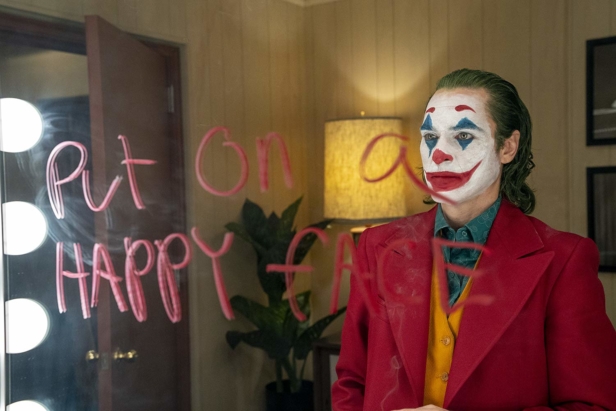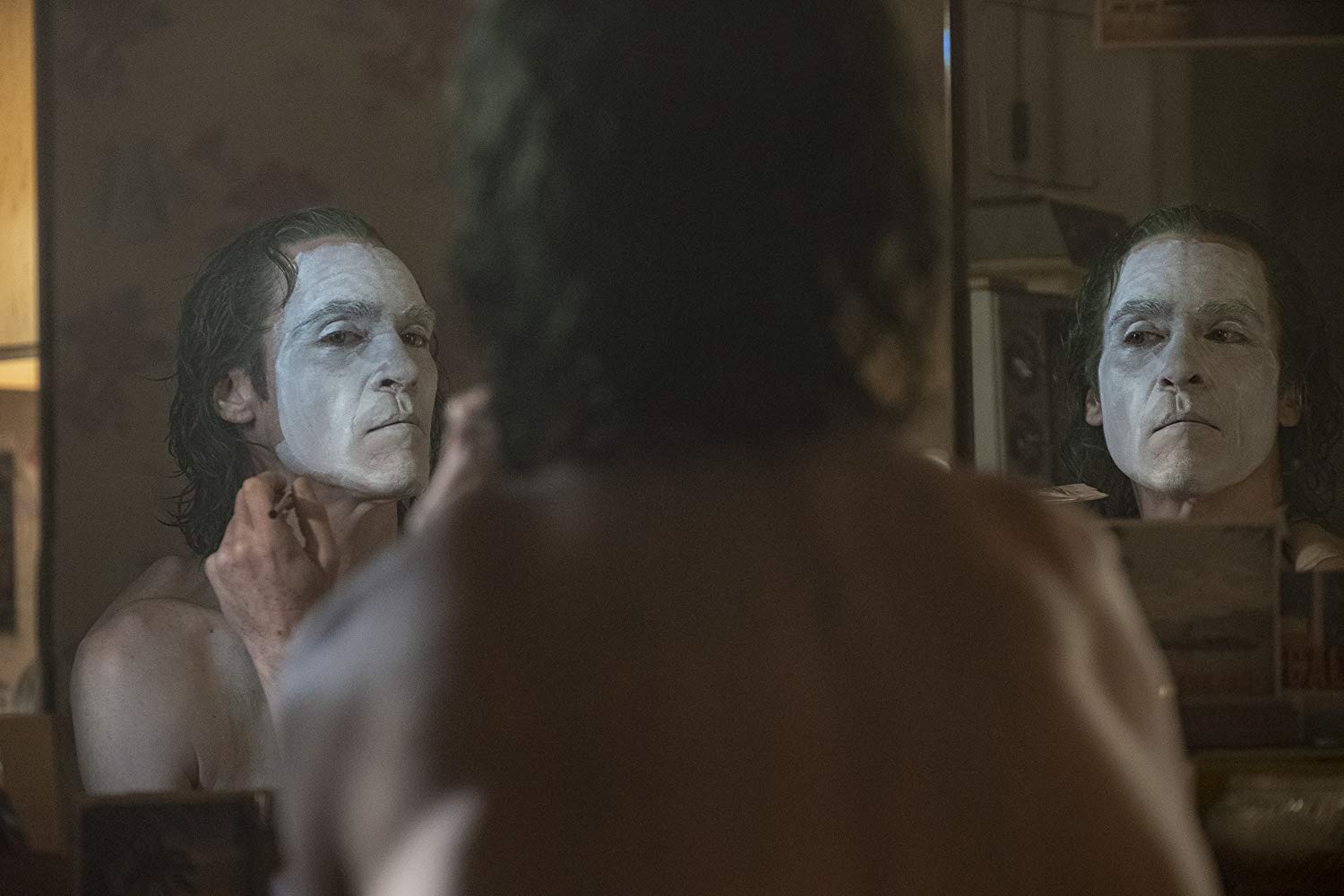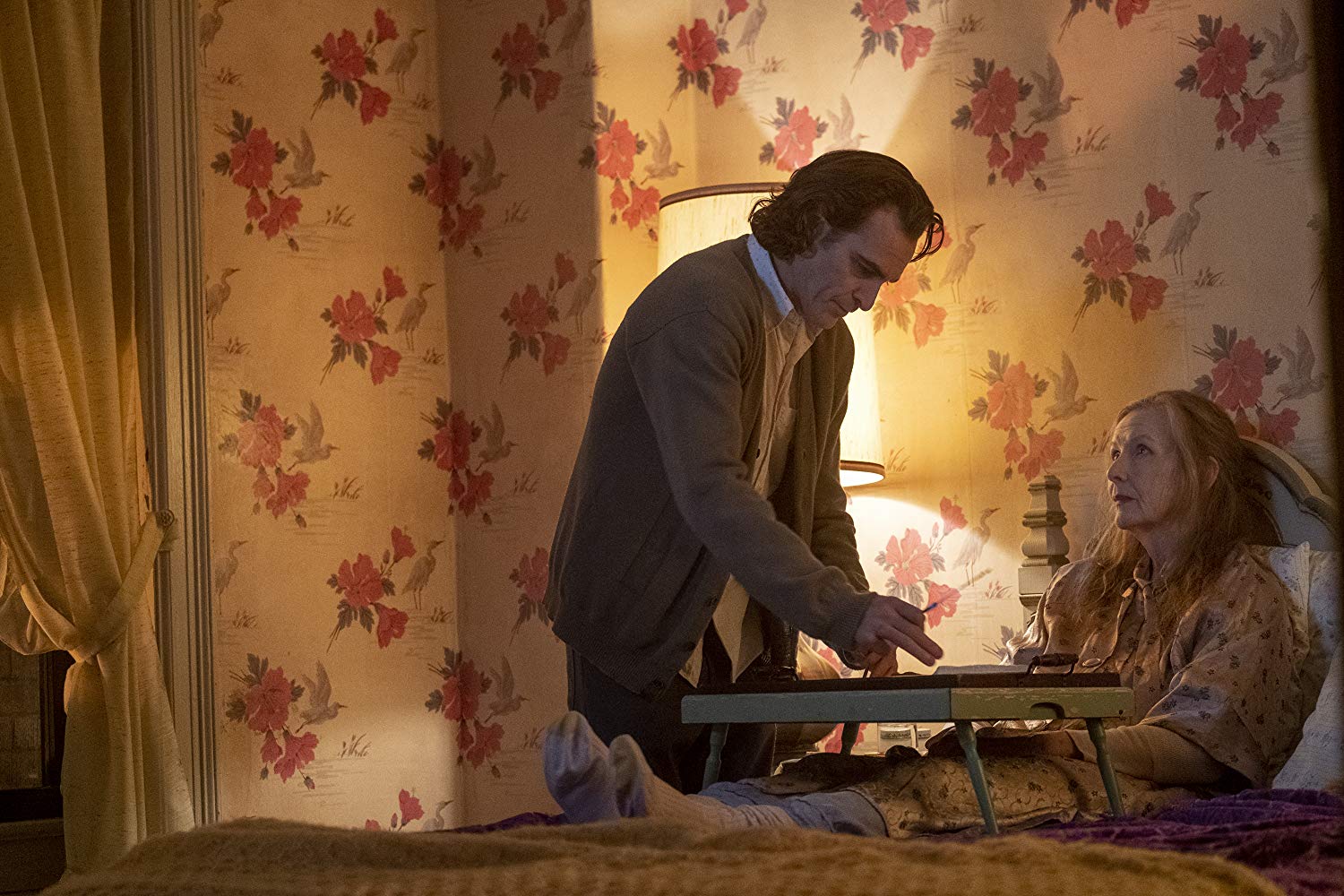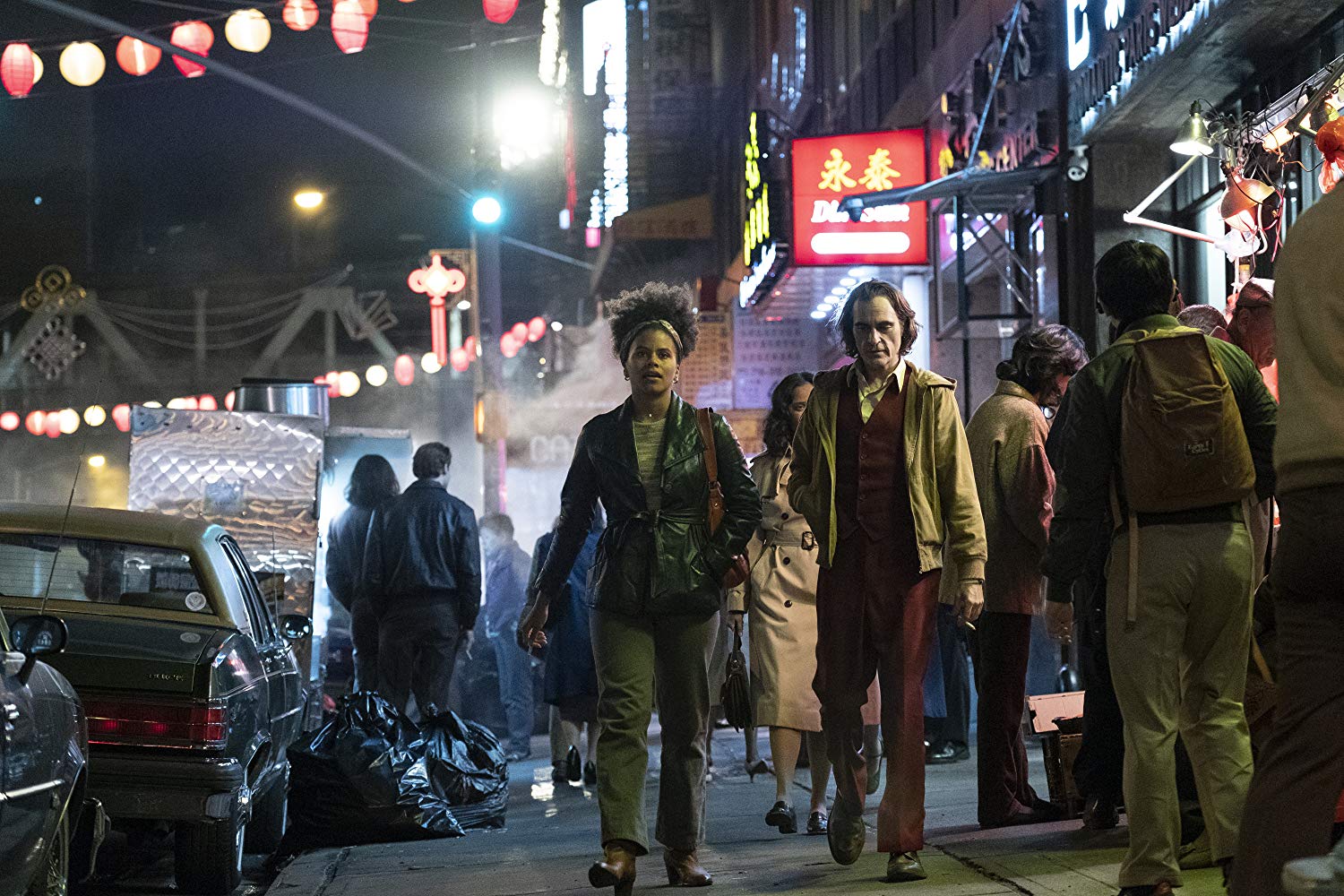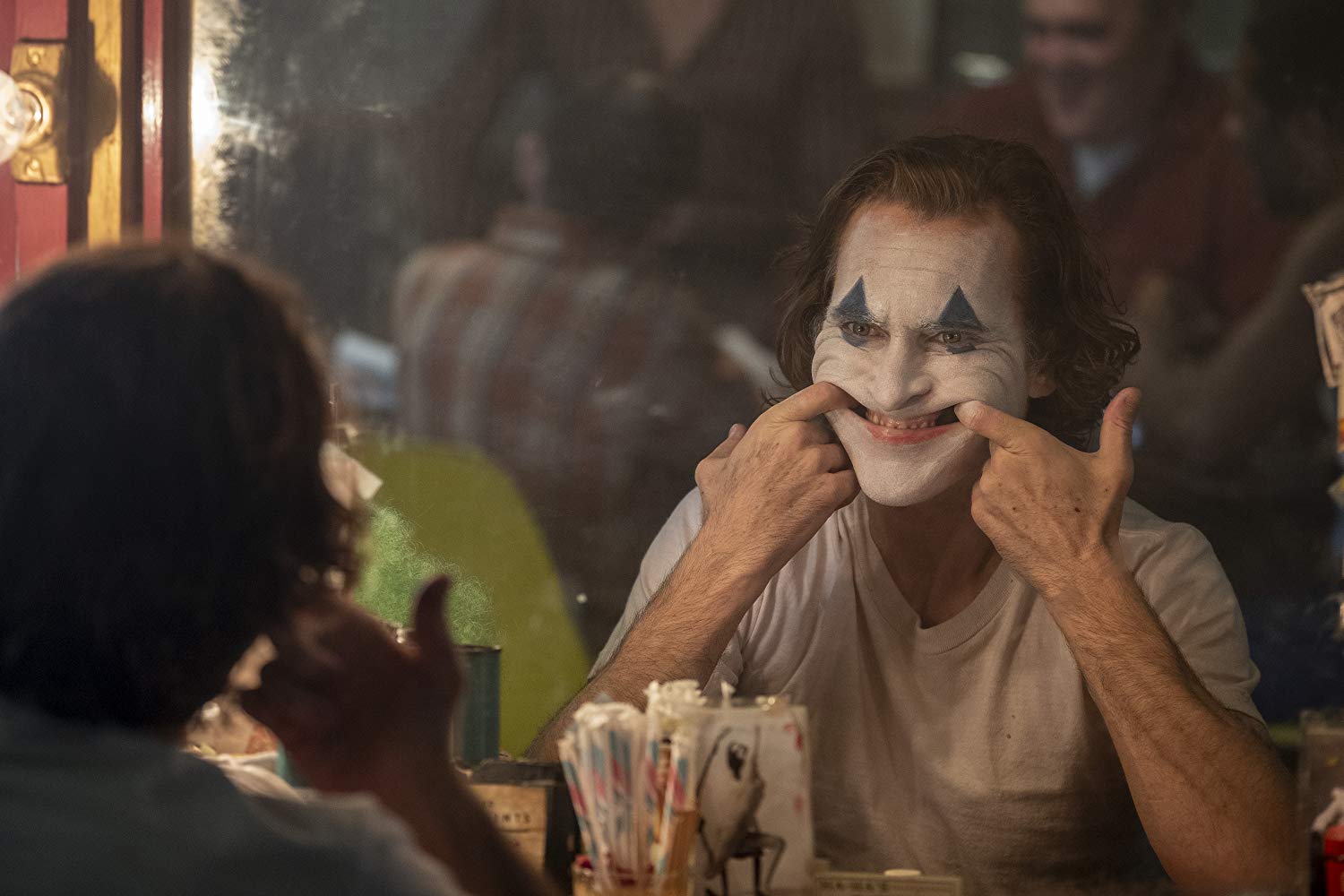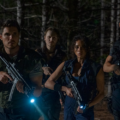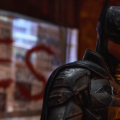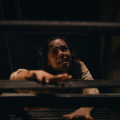Joaquin Phoenix and Todd Phillips take us inside the most dangerous comic book movie in years…
“There’s a million reasons why they would have – they should have said no. Or they could have said no, I should say,” admits Todd Phillips.
It’s true that there has never been a safer time to release a comic book movie. The MCU has just concluded their decade-plus strong Avengers saga, the critically derided Venom grossed over $850 million worldwide, and Warner Bros and DC have seen huge returns both critically and commercially by steering more towards Big Fun standalone adventures with Wonder Woman, Aquaman and Shazam! But a side-effect is that failures are even more apparent, even more costly, as Fox (and the reportedly livid Disney) discovered with X-Men: Dark Phoenix. If you misstep, everybody is going to see it and the pressure to stay on-message, to stick to a format that clearly works, must be stronger than ever.
So, Joker doesn’t feel like it fits, does it? Even as WB/DC continues to edge further away from its shared universe plans in the wake of Justice League, Phillips’ film is a clear outlier. Not only is it a film that focuses on a villain (not even a Skwad of bad guys doing good), it’s so standalone that there’s not a whiff of an in-universe cameo, set in an early 1980s Gotham City that resembles the grubbiest version of Martin Scorsese’s New York. It presents a new (ish) origin story for the best-known bad guy in comics and give him a brand new name: Arthur Fleck. He’s a broken down aspiring comic looking after his mother and struggling to resist his violent impulses in a world he no longer perceives to be sane, and there’s not a purple zoot suit or a vat of toxic chemicals in sight (for the moment at least) Oh, and it’s rated R.
“Whether you liked the movie or didn’t like the movie, what I think you can’t deny is that it’s sort of bold,” Phillips states. “I think we wrote a bold script. Joaquin gave a very bold performance. And I think at the same point Warner Brothers was bold in letting us do it. But that didn’t come overnight. There was a lot of convincing and a lot of hoops to jump through because this is a character they’ve had for 75 years and has a history and here we are saying we’re going to give an origin story to something that never had an origin.”
“The movie keeps one toe in the comic book world, but we were free to do whatever we wanted,” he continues. “Again, I think it speaks to how bold the studio was ultimately, even though they didn’t start that way.”
From a filmmaker’s perspective, not to mention a comic book fan’s, the appeal of a story like this is obvious. After all, there’s a rich tradition of dark and eccentric standalone one-shots and graphic novels that allow creators to play around with the established canon, to explore elements of characters and to try different styles without anyone having to worry about how on Earth they could incorporate a game-changing or batshit storyline into the ongoing narrative. Given that light and funny are the quickest route to success if you haven’t spent the last decade getting people invested in your movie universe, you can see that would be a slightly unsettling prospect for Warner Bros.
Intriguingly, however, Phillips didn’t just pitch them on a standalone. No, he was swinging much bigger than that. “What I really went to Warner Bros with was a whole arm of DC,” he remembers. “I said we should create a whole other division of DC called DC Black. I just made it up. Doesn’t matter, they didn’t want to do it. But the point was I go in that arm [and] you don’t have to follow the rules of other comic book movies. We can do character pieces; you can get filmmakers involved that want to do deep dives into characters. But do them like independent movies. Independent to Warners is $50 million,” he explains, before anyone starts imagining a Blumhouse-esque figure. “But meaning keep the costs way down. And let’s do movies that don’t rely on CG and things flying through the air and exploding buildings.”
Even before it was announced that Joaquin Phoenix would be donning the make-up, the buzz around Joker was absolutely what Phillips describes above. With the exception of Alan Moore and Brian Bolland’s endlessly divisive The Killing Joke, no comic inspirations were discussed, and it was notable that there were no comparisons to previous DC movies in terms of tone or style. Now it was all Scorsese, with Taxi Driver and The King Of Comedy cited as reference points (the maestro was on board as a producer early on before dropping out due to other commitments).
“I love movies, I grew up on movies like everybody,” Phillips explains. “Movies in the last five or ten years have been – okay, the comic book movies have been obviously taking over the world. They’re beautifully done and they’re great stories. But in a weird way it goes back to how did it begin. It was a little bit about how do you sneak a real movie in, get people to show up. Because it’s not a comic book movie, but again keeping one toe in it but kind of sneaking a real movie in a weird way.
“I don’t mean to say that Avengers aren’t real movies,” he continues. “They are. Or any of those movies. They serve a thing. But in a weird way you can’t get a character study, which really I think those movies – King Of Comedy, Serpico, Cuckoo’s Nest. These are character studies. People make them nowadays. One of the best is Social Network and There Will Be Blood. Those are great character studies. But they’re harder and harder to get made. What if we do a character study about a comic book character, but a real character study? That really was the impetus of it.”
Then there’s the multi-million dollar question: who do you get to play that character? Not only is the Clown Prince Of Crime an iconic creation, but it’s a role that comes with a huge amount of baggage. While Jared Leto’s method antics may have terrorised his fellow cast members more than audiences, Heath Ledger’s turn in The Dark Knight still looms very large indeed, not to mention the iconic capering of Jaaaaaack…
“I bet you Heath Ledger was nervous because the last Joker then was Jack Nicholson,” Phillips demurs. “And I think that’s kind of what’s kind of exciting about the role. I wasn’t nervous. I mean, there’s a lot of nervousness with a movie in general, but some of it is more about expectations of people, like what are people expecting from a movie called Joker. But the exciting part for me when we came up with the idea was really there are no rules with Joker. And really it’s always attracted very interesting actors, from Jack to Jared to Heath, which is undeniable.”
“[Phoenix is] fearless in his choices,” he continues. “And I don’t mean the movie roles he chooses, but the choices he makes on camera. And I think you need an actor like that. I think if you’re going to play Joker you have to have just a kind of fearlessness. He never does anything halfway. He just goes. I knew if he was going to say yes we were going to go, like deep into it.”
Still, the fact that Joaquin Phoenix agreed to do the film took a little getting used to. The actor has cemented his reputation as one of the most impressive performers working today and had turned down Marvel movies in the past, reportedly due to those infamous multi-film contracts. As it turns out, he didn’t think was going to take the offer either.
“When he first approached me I thought there’s no way I’m going to do this movie,” Phoenix remembers. “When I just heard about it, I said I want to meet him because I like him as a filmmaker and I want to hear what he has to say. I always felt like there’s real opportunity to explore a lot with these characters that I didn’t feel like I’d really seen in other comic book movies.”
“We met and he just – first he showed me these videos of these laughing fits that were really surprising,” he continues. “He talked about the laughter as being almost painful for him. I thought that was a really interesting way of looking at it, which I had never kind of thought about. That piqued my interest and we just continued having conversations.”
Although Phillips has made a move into dramas with 2016’s War Dogs, he’s still known as a comedy director. This is the man who gave us Road Trip, The Hangover trilogy and Due Date (anyone remember Due Date?). But Phoenix found Phillips’ passion and take on the material was irresistible. “Every time I met him he just was driven and really passionate about it and felt like he had a unique perspective and that he wanted to be bold,” he enthuses. “He didn’t have to answer to anybody, he was just kind of following his instinct. The more that I got to know him the more that I thought he was perfect to direct it. This wonderful, wild, rancid, irreverent humour that he has. And also a deep sensitivity and empathy and compassion. I just thought, yeah, I want to work with this guy and it seems like he really understands this role and this character and he has something to say.”
One thing that each screen incarnation of the Joker has in common is that they are unique. From Caesar Romero’s dandy and Jack’s dapper gangster, through to Ledger’s scarred agent of chaos and Leto’s Juggalo Mister J, each actor has brought something that’s entirely their own to it and Phoenix tells us that he was determined to carve out his own territory.
“As we began researching I felt like it was really important that we just go our own way,” he explains. “I didn’t want to be influenced by the comics or any other performances. I didn’t take any of that in, to be honest. We really tried to kind of approach this from the inside as a man, exploring that as opposed to this kind of iconic super villain that we know. It was an origin.
“The original script said Joker: an origin, not the origin,” he continues. “I thought that was an interesting distinction. It was just this one possibility of how this character could have come to be. That, I think, just allowed us a lot of freedom to explore the way that we wanted to.”
While Phillips is keen to point out that reports of their not using any of the comics as source material have been overstated, it’s clear that this isn’t going to be a faithful recreation of The Killing Joke, for example. “We went off of memory,” he explains. “I read comics as a kid and we didn’t want to necessarily dig through stuff and turn it into an adaptation of one of those. Not because they weren’t great, just because we wanted to just create something brand new. We went off of our memory a little bit of those comics. I mean, of course we could look something up and, wait, what was the dad’s name, oh yeah Thomas Wayne that’s interesting. But the goal was really to create something absolutely unique and different while still keeping, like I said, a toe in that comic book world. I think it’s Killing Joke was the idea that he was a comedian at one point. So we really latched into that idea.”
“I never really knew much about Joker, honestly,” Phoenix tells us. “But I have an appreciation for how we were exploring him.” For the actor, the exploration was a lengthy process which became more and more hair-raising as the cameras started to roll.
“We had shot for I think six weeks and hadn’t done anything with Joker,” he remembers. “Because you see Joker for a limited amount in the movie. When we first were going in I went in and assumed we’re shooting in order. [Phillips] goes ‘Of course we’re not shooting in order, how many fucking movies have you made?’ ‘Well, I can’t be the Joker, I’ve got to wait until the end.’ They said that’s impossible.”
However, Phillips worked to give Phoenix what he needed, and the process of discovery continued well into shooting. It’s a creative process that the actor clearly relished, telling us that, “Todd really created this amazing, creative space in which we could make mistakes, really. And we could discover something. I think that was the thing that I was most concerned about, do we have to make a decision and are we on the clock or are we going to run out of time. He set up the schedule, and he really fought for it early on and I didn’t understand in our early meetings he was like, ‘I’m really ensuring that we are going to have time to work this through.’ It became so important because we really on set I think discovered so much of who the character is.”
“I don’t think I’ve ever spent as much time with an actor just talking about the movie and going through it,” adds Phillips. “We would rework things on the weekend or the night before. It wasn’t so much on the minute making up lines. With a guy like Joaquin you just give him room to work. You just go, ‘Here’s the room,’ and you just watch him and he starts to sit over here and you go, ‘Okay, he’s going to sit over here.’ It was a very loose vibe that I think really worked for him.”
“I didn’t really know what it was going to be,” Phoenix marvels. “I didn’t know, and it was terrifying. We’d done makeup tests and the wardrobe and the head suit put on but I’d never put it all together until we started shooting that day. In hindsight you look back at all these things that influenced it, and some of it were ideas that didn’t make it into the movie that I kind of explored in other parts of Arthur in scenes that were cut out. But I could see their influence on Joker later on. Really when I did that, when I was Joker, I suddenly started to understand Arthur in a different way.”
Phoenix may have shied away from being influenced by other interpretations but he tells us that there were a couple of important touchstones for his take, including one theatrical character who’s not afraid of a little white face powder and red lipstick. “Really I think there’s a good amount of Frank-N-Furter in there,” he grins. “I slowly realised – I’ve always loved since I was 14 years old and saw Rocky Horror Picture Show I was like this is the most brilliant thing I’ve ever seen in my life and one of my favourite movies. I love Frank-N-Furter. I suddenly realised I was doing a couple lines and Todd was like who is that? I was like I don’t know, it’s Katharine Hepburn. That’s Katharine Hepburn. We suddenly realised there’s this Katharine Hepburn element.”
So much has been made over the years about the gruelling extents actors have to go through to find the character, and while there’s no denying the results, it’s kind of reassuring to when Phoenix shies away from a question about whether or not he could shake the character off at the end of the day.
“You can’t answer that without sounding like a fucking jerk,” he replies. “How do you do that? Either you sound like you’re not committed or you sound just pretentious. It’s like a lose-lose. But usually the end of the night there wasn’t an end, because we would go home and then either I would text Todd or he would text me about the next day and we would do that for like an hour until finally we’d call each other and go, “We can’t text this anymore, let’s just talk,” and we’d talk. I never felt this moment of we’re done with work now. I also didn’t have a fucking life because I couldn’t eat, I couldn’t go out to dinner. I had my fucking lettuce that I got every night, I didn’t socialise at all. During the weekends we would get together. So it was just nonstop. I think, to me, that’s the best. You’re not making a conscious decision saying I’m staying in the character, this is my character. It’s happening all the time.”
However, he’s quick to note that this wasn’t a process he resented in the slightest. “I had a fucking ball,” he grins. “I had a ball. I did. I want to say it was really hard because it makes me sound – but I had a fucking ball. Yeah, it was difficult and you do a lot of work. But it was so inspiring. However much energy I put into it, it was reciprocal, I gave it back I would go home after work and we would just talk because we were excited. And there was so much to figure out in that coming week. I never felt like – I don’t know, I don’t really remember that. I remember just being super excited to get to set. We also would show up at set two hours early just to get there as soon as possible, meet in the trailer, talk about things. It was the time of my life.”
As the film nears its release date, there are the inevitable conversations about a sequel (“That’s dependent on the audience, right?” Phoenix demurs) and there are rumours floating around about Leto’s return to the DCEU, not to mention the potential for the Joker to appear in Matt Reeves’ Batman movie. This is a character that will never go away, and which continues to provide actors and storytellers with so many possibilities.
“I think people are fascinated by the chaos he represents,” Phillips muses. “I’m talking about the traditional Joker. I don’t know that our Joker has that. He’s just a thrilling character. For me it was like the same, why is Scarface so intriguing, he just has no rules, he just represents something. In one of the movies, he just wants to watch the world burn. What is that? Where does that come from? There’s so much to me. We could have done five different versions of this, we chose this more subtle approach. But there’s another movie in your head, you can go, yeah, let’s make a movie about a guy who just wants to watch the world burn. I don’t think that’s Arthur, but that’s interesting, too.”
“I didn’t really approach thinking about him as mentally ill,” Phoenix tells us. “At some point he writes it, mental illness, he has that joke in his book. That’s something that he’s just been told that his whole life. He’s on seven different medications. The only thing I think that I felt pretty strongly about was that he was a true narcissist. In that somebody that has a narrative in their head about how they function in the world, who they should be in the world. And that he would use any technique necessary to perpetuate that narrative… I’m sure that everybody kind of see the character in a different way and everyone has a different appreciation for him.”
This article first appeared in SciFiNow issue 163.
Find more interviews, reviews, news and exclusives at SciFiNow.
